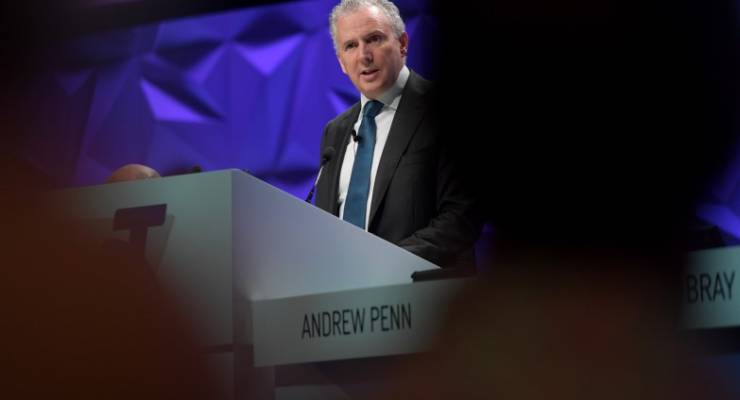
Andy Penn, Telstra CEO
In 2010, new Nokia chief executive Stephen Elop issued his now famous “burning platform” email. Using the example of a North Sea Oil worker leaping off a burning, sinking rig, he explained that a company and its employees can either cling onto a broken business model and perish, or jump into the water and survive by changing behaviour.
It’s apposite that Elop is now a senior Telstra executive, and whether he had any influence or not over the dramatic overhaul of the telco, announced by his boss Andy Penn on June 19, it was certainly textbook burning platform stuff.
The company’s share price is now $2.71, its lowest point in seven years, having lost about 60% of its value on Penn’s watch. The entire industry is losing revenues to so called “over the top” players in social media, especially in mobile. For instance, voice and video calling on apps like WhatsApp, Skype, or Facebook Messenger are rapidly replacing traditional, paid-for calls.
The headlines of Penn’s plan are, firstly, the human side; sacking 30% of the company’s staff, much of it a clean-out 0f the company’s famously well-paid middle and senior management — whose expense accounts often match their take-home salaries — as part of an accelerated cost-cutting program, which promises to save $1 billion in labour costs between now and 2022.
Then there is the overdue structural separation: the carving-out of its fixed and data-centre assets into InfraCo, a new standalone company with its own chief executive.
But perhaps the easiest to execute piece of core business is the accelerated investment and deployment of game-changing 5G mobile technology. It is this that Telstra plans to use as the centrepiece of a strategy known as mobile bypass (of the NBN network). This is the key to the company’s success in nailing down fixed-line and mobile revenues and market leadership in the so-called Internet of Things, where millions of everyday devices are connected to the internet for monitoring, security, billing and myriad other efficiency-driving applications.
Any one of these things is a major project. To attempt them all at once puts Penn in the category of crazy and/or brave.
In fact, one could argue that Telstra, or rather traditional telecommunications companies, have been slow-burning platforms since the emergence of the internet and that neither peripatetic deal-making nor studied incrementalism will no longer do.
Elop’s bid to overhaul Nokia came too late; by 2010, Apple’s iPhone was dominating the field, and Samsung would come in from the other side. Telstra doesn’t have the same competitive pressure as electronic device makers. Infrastructure investments take longer to build and competition takes longer to take hold. Wars take longer to play out than those in the retail business.
While promising to take a wrecking ball to the company is certainly a brave way of clearing the decks for a fresh start to the next financial year, the timing now looks serendipitous coming in the middle of the stunning Optus World Cup soccer streaming debacle.
Penn’s job, and indeed those on his board who set the company’s strategy, are clearly on the line. But it should be encouraging for investors who themselves have missed their opportunity to sell or who can see the potential in the strategy and are happy to settle in for the long term, that they are not going down without a fight.
His problem is that Telstra, unique among Australia’s storied blue chips, has internal vested interests entrenched over generations, loyal to networks of internal mini-empires. They too will not go down without a fight.








“In fact, one could argue that Telstra, or rather traditional telecommunications companies, have been slow-burning platforms since the emergence of the internet ”
I tend to agree. In a way the old telecommunications companies are like journalism, stuck in old business models that are just standing out for competition from more agile players. Due to their policy of paying dividends, many superannuants have been bitten by the capital losses, without necessarily realising it yet. Perhaps at that stage they’ll be calling for the government to take them over and nationalise it.
Fun times ahead.
This certainly won;t improve their disgusting, useless lying customer (dis)service people. I have been fighting with them for two months and have received lies, baseless offers of services that they cannot deliver and great inconvenience. I would love to talk to someone for whom English was at least their second language, not third or fourth.
Weren’t Penn & Tellerstra a prestidigitation comedy magic act?
Good to see that they are still treading the Boards.